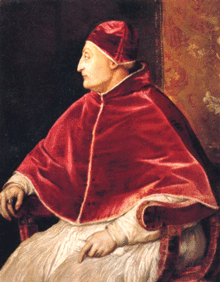Francesco della Rovere
|
Pope Sixtus IV |
|
|---|---|
| Bishop of Rome | |

Posthumous portrait of Pope Sixtus IV by Titian
|
|
| Papacy began | 9 August 1471 |
| Papacy ended | 12 August 1484 |
| Predecessor | Paul II |
| Successor | Innocent VIII |
| Orders | |
| Consecration | 25 August 1471 by Guillaume d’Estouteville |
| Created Cardinal | 18 September 1467 by Paul II |
| Personal details | |
| Birth name | Francesco della Rovere |
| Born |
21 July 1414 Celle Ligure, Republic of Genoa |
| Died | 12 August 1484 (aged 70) Rome, Papal States |
| Previous post |
Minister General of the Order of Friars Minor (1464-1469) Cardinal-priest of San Pietro in Vincoli (1467-1471) |
|
Papal styles of Pope Sixtus IV |
|
|---|---|
 |
|
| Reference style | His Holiness |
| Spoken style | Your Holiness |
| Religious style | Holy Father |
| Posthumous style | None |
| Ordination history of Pope Sixtus IV | |
|---|---|
|
Episcopal consecration
|
|
| Principal consecrator | Guillaume d'Estouteville |
| Date of consecration | 25 August 1471 |
|
Cardinalate
|
|
| Elevated by | Pope Paul II |
| Date of elevation | 18 September 1467 in pectore (revealed 19 September 1467) |
|
Bishops consecrated by as principal consecrator
|
|
| Pierre Engelpert | 25 March 1477 |
| Georg Hessler | 13 February 1480 |
| Giuliano della Rovere | 1481 |
| Matthias Scheit | 31 December 1481 |
Pope Sixtus IV (21 July 1414 – 12 August 1484), born Francesco della Rovere, was Pope from 9 August 1471 to his death in 1484. His accomplishments as pope included building the Sistine Chapel and the creation of the Vatican Archives. A patron of the arts, the group of artists that he brought together introduced the Early Renaissance into Rome with the first masterpieces of the city's new artistic age. Sixtus aided the Spanish Inquisition, though he fought to prevent abuses therein, and annulled the decrees of the Council of Constance. He was famed for his nepotism and was personally involved in the infamous Pazzi conspiracy.
Francesco was born to a family of modest means from Liguria, Italy, the son of Leonardo della Rovere and Luchina Monleoni. He was born in Celle Ligure, a town near Savona.
As a young man Della Rovere joined the Franciscan Order, an unlikely choice for a political career, and his intellectual qualities were revealed while he was studying philosophy and theology at the University of Pavia. He went on to lecture at Padua and many other Italian universities.
In 1464, Della Rovere was elected Minister General of the Franciscan order at the age of 50. In 1467, he was appointed Cardinal by Pope Paul II with the titular church being the Basilica of San Pietro in Vincoli. Before his papal election, Cardinal della Rovere was renowned for his unworldliness and had even written learned treatises entitled On the Blood of Christ and On the Power of God. His pious reputation was one of the deciding factors that prompted the College of Cardinals to elect him pope upon the unexpected death of Paul II at the age of fifty-four.
...
Wikipedia
